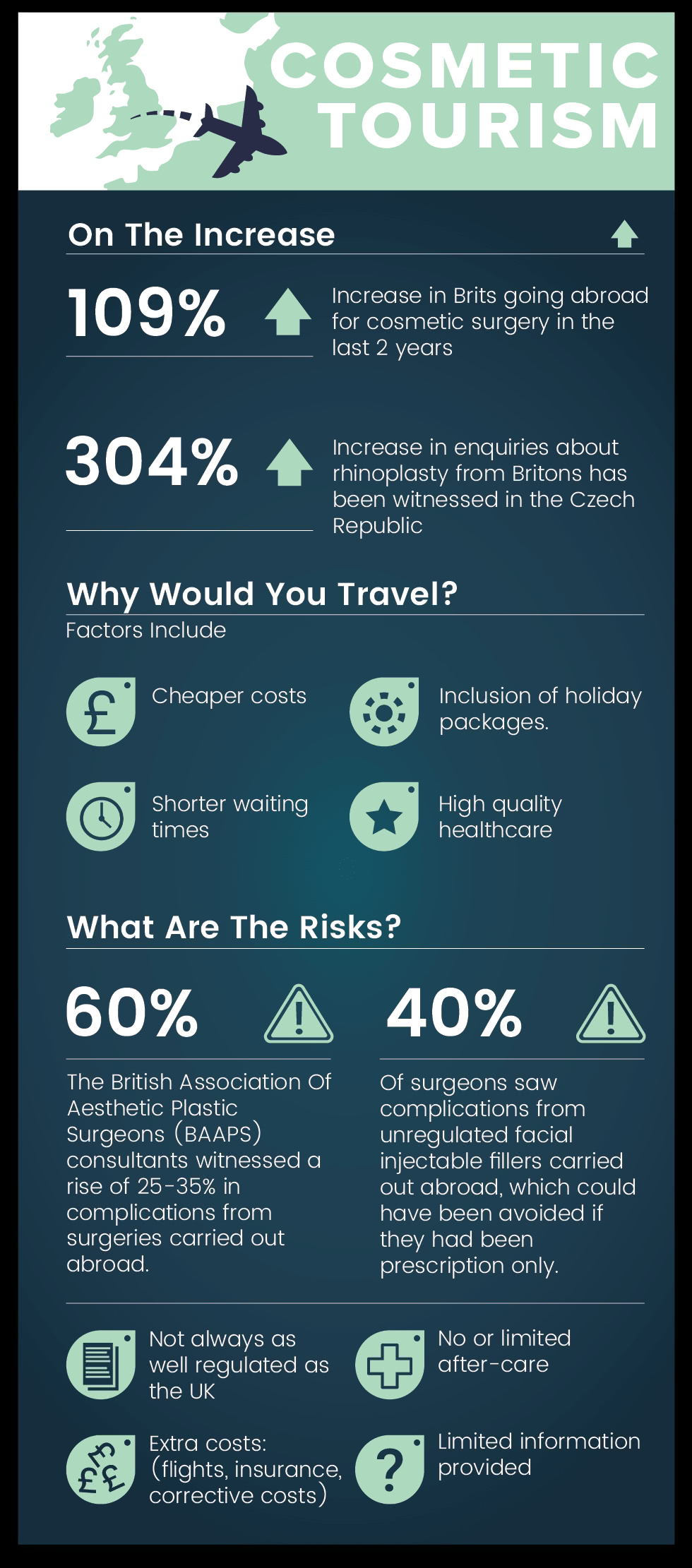The Rise of Cosmetic Tourism
Published on: 9 Jan 2017
Mr Debashis Ghosh
NHS Consultant
GMC Number: 4657664

Medically reviewed by a licensed NHS consultant
Last updated: 15/08/2019Get Free & Simple Pricing, Procedure & After Care Information from a Licensed Consultant Now
2015 saw a 12.6% rise in cosmetic surgery from 2014. This increase is likely due to more openness from celebrities having surgery done, notably Iggy Azalea and Kylie Jenner who have both admitted to undergoing surgery last year. Subsequently, cosmetic surgery now faces less stigma, whereas in the past celebrities would be far more conservative about opening up about their treatments.
Other factors include; an increase in the use of social media and the sharing of images, as well as economic recovery, meaning that more can afford these expensive procedures, and competition between surgeons which lowers prices.
Although women make up 91% of all procedures, the numbers for men are going up, with the number almost doubling in the past decade to 4,614 procedures last year.
The top 3 procedures in the UK are breast augmentation, eyelid surgery and face/neck lifts. Among men, the most common are eyelid surgery, rhinoplasty (nose reshaping) and breast reduction.
 (Iggy Azalea)
(Iggy Azalea)
Photo credit: DFree/ Shutterstock
Cosmetic tourism
There is an increase in “cosmetic tourism”, which refers to individuals going abroad for surgery, as part of a holiday break and for the cheaper price of surgery abroad, even when taking flights into consideration.
The number of Brits going abroad for treatment has risen by a startling 109% in the past 2 years.
Many destinations are becoming popular for cosmetic surgery, including Brazil (which is growing rapidly for cosmetic surgery, Brazilians are among the highest in the world for cosmetic procedures at 10% of the world’s procedures) India, Turkey, North Africa (although, the latter two have noticed a drop due to threats of terrorism), and the Balkans.
However, for Brits, Central and Eastern Europe are the most popular destinations, due to their geographical closeness, cheap flights and cheaper costs of surgery.
In fact, the Czech Republic saw a 304% increase in nose jobs last year.
However, going under the knife abroad is not without risks, and should not be considered lightly.
2 out of 5 surgeons have continued to see a rise in problems from cosmetic surgery abroad, with 60% witnessing an increase by as much as a quarter.
40% of surgeons saw problems arise from unregulated facial injectable fillers carried out abroad, which could have been avoided had they been prescription only. A survey was carried out on members of the British Association for Aesthetic Plastic Surgery (BAAPS), and they reported a worrying rise of 25-35% in complications abroad.
Clinics abroad may not have the same strict inspections and procedures as the UK, where all surgeons have the be GMC registered.
Cosmetic Tourism Infographic

Corrective surgery back home
Brits are spending an alarming £8.2 million on having post-surgery corrections in the UK, and many of these are a result of surgery abroad. However, it is usually always better to go back to the initial surgeon, as they are familiar with the patient and the past procedure.
“One thing you must consider is after care. It is very stressful and hard to find a doctor to take care of it when you’re back home, as they are not familiar with your case.” – Cosmetic tourist, who had rhinoplasty in 2015 in Poland.
“I am having revision surgery in the UK where at least I can nip back if there are further problems, without an arduous and stressful 6 hour journey each way and all the language difficulties etc.” – Cosmetic tourist, who underwent breast reduction in Czech Republic.
Tips when going abroad for cosmetic surgery:
Avoid websites selling surgery as part of a holiday.
Ensure you speak to your surgeon prior to surgery.
Ensure you have a detailed consultant with the surgeon who will carry out the surgery.
Never pay anything to a hospital you’ve never checked out prior to the surgery.
Surgeons should also ensure you fully understand the procedure – the alternatives, limitations and risks involved.
Surgeons should provide you with tips on how to recover – i.e. do’s and don’ts.
You should be required to return to the hospital for check-ups, as part of after care.

Photo credit: ASDF_MEDIA / Shutterstock
However…
Not all experiences of going abroad for surgery are negative. Cosmetic surgery, whether home or abroad is not without risks. Yet, thankfully, with the exchange of information online, it is far easier to research into different surgeons and procedures, and really do your research before committing. Many have had wholly positive experiences getting surgery abroad.
“Absolutely brilliant. I recommend for everyone not to be afraid about the so called “low quality” cause the quality is excellent. And of course, not to mention all the money you can save.” – cosmetic tourist who underwent breast enlargement in the South Africa.
Brexit
Those in the profession are wondering what the consequences of Brexit will be on cosmetic surgery. The pound is down against the euro, which means going abroad can be potentially costlier for Britons. Though, if EU citizens will be restricted from claiming on the NHS, waiting lines may reduce for patients having surgery here in the UK.
Government is also calling for a “clean up” of the industry, so that when foreign hospitals carry out poor treatment, and the patient requires reconstructive surgery, the hospitals abroad can be invoiced for the costs, lessening the strain on the NHS.
It seems that cosmetic tourism has no signs of slowing down, particularly as the quality of health technology grows, the quality of surgery is becoming more and more realistic. Yet, it is likely that whilst costs in the UK are so high, Brits will still consider jetting off abroad to go under the knife.